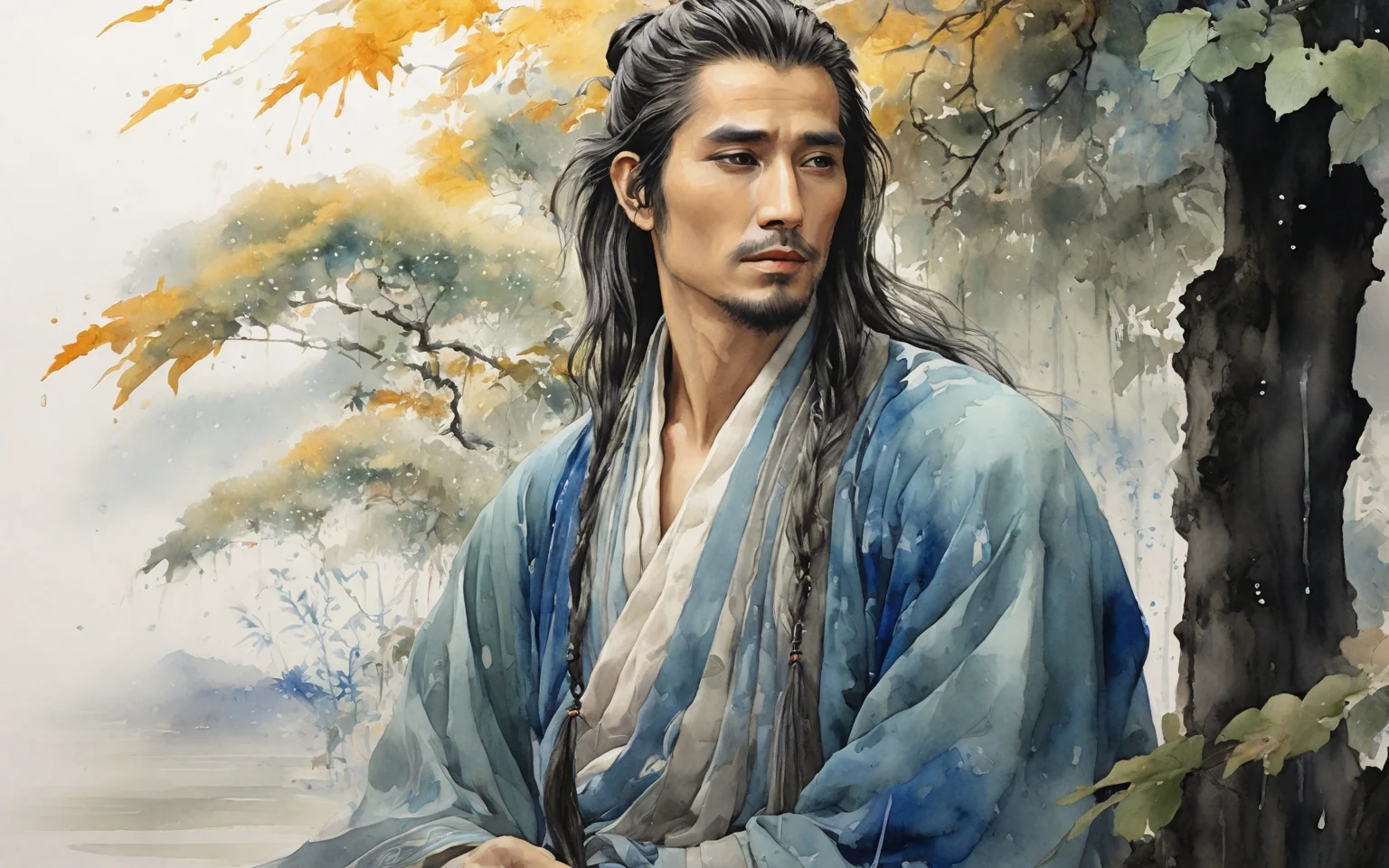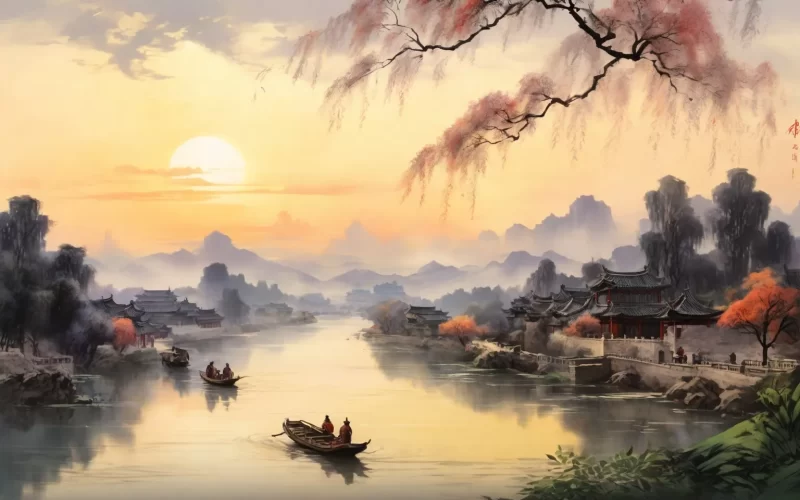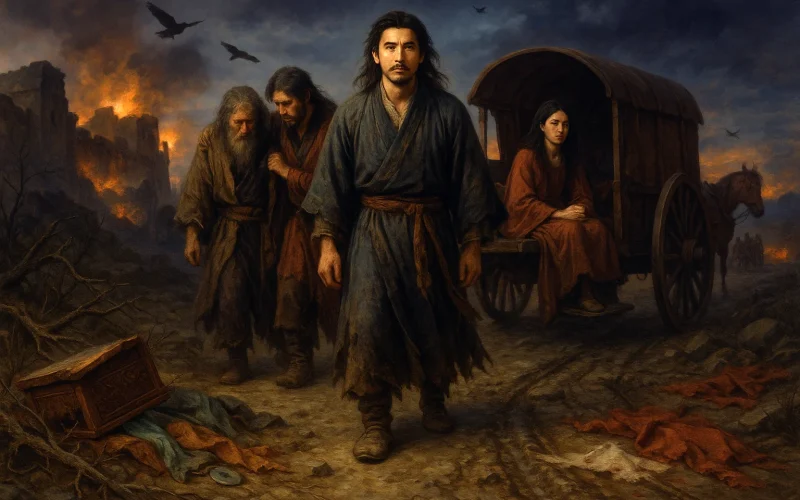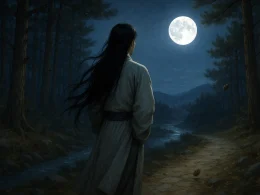I am only an old woodsman, whispering a sob,
As I steal like a spring-shadow down the Winding River.
...Since the palaces ashore are sealed by a thousand gates --
Fine willows, new rushes, for whom are you so green?
...I remember a cloud of flags that came from the South Garden,
And ten thousand colours, heightening one another,
And the Kingdom's first Lady, from the Palace of the Bright Sun,
Attendant on the Emperor in his royal chariot,
And the horsemen before them, each with bow and arrows,
And the snowy horses, champing at bits of yellow gold,
And an archer, breast skyward, shooting through the clouds
And felling with one dart a pair of flying birds.
...Where are those perfect eyes, where are those pearly teeth?
A blood-stained spirit has no home, has nowhere to return.
And clear Wei waters running east, through the cleft on Dagger- Tower Trail,
Carry neither there nor here any news of her.
People, compassionate, are wishing with tears
That she were as eternal as the river and the flowers.
...Mounted Tartars, in the yellow twilight, cloud the town with dust.
I am fleeing south, but I linger-gazing northward toward the throne.
Original Poem:
「哀江头」
杜甫
少陵野老吞生哭, 春日潜行曲江曲。
江头宫殿锁千门, 细柳新蒲为谁绿。
忆昔霓旌下南苑, 苑中景物生颜色。
昭阳殿里第一人, 同辇随君侍君侧。
辇前才人带弓箭, 白马嚼啮黄金勒。
翻身向天仰射云, 一箭正坠双飞翼。
明眸皓齿今何在, 血污游魂归不得。
清渭东流剑阁深, 去住彼此无消息。
人生有情泪沾臆, 江水江花岂终极。
黄昏胡骑尘满城, 欲往城南望城北。
Interpretation:
In the autumn of the first year of Emperor Suzong’s Zhide reign (756), Du Fu left Fuzhou and traveled to Lingwu to seek refuge with Emperor Suzong. Unfortunately, he was captured by the rebel forces of An Lushan and taken to the fallen city of Chang’an. The following spring (757), Du Fu secretly arrived at Qujiang, only to find the once-glorious imperial gardens now desolate. The stark contrast between past prosperity and present decay overwhelmed him with sorrow, prompting him to compose this poem to express his profound grief over the fall of the nation and the loss of his home.
First Couplet: “少陵野老吞生哭,春日潜行曲江曲。江头宫殿锁千门,细柳新蒲为谁绿。”
The old man of Shaoling can only suppress his sorrow and weep in silence, as the spring sun quietly graces the winding paths of Qujiang. The palace halls by the river are now tightly shut, and who is left to admire the fresh green of the willow and cattails?
The poet refers to himself as the "old man of Shaoling," and the phrase “swallowing his cries” illustrates his silent grief as he wanders through enemy-occupied territory. His sorrow is not only personal but also reflects the danger of his circumstances. Despite the arrival of spring, the palatial halls along the river remain sealed, their past grandeur now a distant memory. Meanwhile, nature continues its cycle, with the willows and reeds flourishing as if unaware of the city's desolation. The poet employs these images to highlight the loneliness and devastation of Chang’an.
Second Couplet: “忆昔霓旌下南苑,苑中景物生颜色。昭阳殿里第一人,同辇随君侍君侧。辇前才人带弓箭,白马嚼啮黄金勒。翻身向天仰射云,一箭正坠双飞翼。”
I recall the past, when the emperor’s colorful banners entered the southern garden, and the landscape seemed to glow in his presence. The most favored lady of the Zhaoyang Hall once rode with him in the same chariot, serving by his side. Before the chariot, the palace maidens, armed with bows and arrows, rode gallantly on white steeds adorned with golden bridles. They turned mid-gallop, aiming toward the sky, loosing an arrow that struck down a pair of soaring birds.
This section depicts a lavish scene from the past, showcasing the extravagant courtly pleasures before the An Lushan Rebellion. Emperor Xuanzong and his beloved consort, Yang Guifei, are at the heart of this spectacle, with palace maidens skillfully displaying their archery on horseback. The imagery of a single arrow felling two birds foreshadows the impending downfall of both the emperor’s reign and Yang Guifei’s life. The grandeur and joy described here stand in sharp contrast to the tragic reality that follows.
Third Couplet: “明眸皓齿今何在,血污游魂归不得。清渭东流剑阁深,去住彼此无消息。人生有情泪沾臆,江水江花岂终极。黄昏胡骑尘满城,欲往城南望城北。”
Where is she now, with her bright eyes and radiant smile? Her wandering soul, stained with blood, can never return. The clear waters of the Wei River continue to flow eastward, while the distant Jian’ge Pass remains deep and impenetrable—those who have left and those who remain have lost all contact. The weight of human sorrow presses tears upon my chest, yet the river and its flowers seem endless, as if this pain will never cease. At dusk, enemy cavalry stirs up clouds of dust throughout the city. I long to go south, yet my gaze drifts northward.
Here, the poem shifts to lament Yang Guifei’s death, forming a stark contrast with the earlier descriptions of her glory. The phrase “her soul, stained with blood, can never return” encapsulates the tragedy of her untimely death, while the mention of the Jian’ge Pass alludes to Emperor Xuanzong’s exile, emphasizing their permanent separation. The poet’s grief extends beyond personal sorrow to encompass the fate of the fallen empire. The river flows on, indifferent to human suffering, mirroring the relentless passage of time. The final lines capture the poet’s confusion and disoriented emotions—his desire to move forward yet being unable to detach himself from the past, symbolizing his longing for the restoration of the fallen capital.
Overall Analysis
"Lament at the Riverside" conveys Du Fu’s sorrow over the desolation of Qujiang and the fall of the Tang dynasty. By juxtaposing past prosperity with present ruin, the poet vividly portrays the devastating impact of the An Lushan Rebellion. The poem transitions from tranquil yet sorrowful observations to grand recollections of imperial revelry, only to abruptly return to the grim reality of war and loss.
The poem begins with an image of a decayed Chang’an, where the flourishing spring scenery contrasts with the city's desolation, reinforcing the theme of impermanence. It then shifts to a reminiscence of the court’s opulent past, showcasing the emperor’s indulgence and Yang Guifei’s favor. This scene, however, is immediately followed by her tragic fate, underscoring the ephemeral nature of power and beauty. Finally, the poem closes with the poet’s own bewildered grief, mirroring the uncertainty and chaos of the war-torn empire.
Literary Features
- Sharp contrasts and strong emotions: The poem skillfully contrasts past glory with present devastation, reinforcing the tragic downfall of Emperor Xuanzong, Yang Guifei, and the Tang dynasty itself.
- Subtle yet evocative allusions: The mention of “twin birds shot down” symbolizes Yang Guifei and the emperor’s intertwined fate, while “blood-stained wandering soul” poignantly describes her death.
- Intertwining scenery and emotion: The poet employs nature—springtime, flowing rivers, and flowers—to both contrast and mirror human sorrow, enhancing the poem’s visual and emotional impact.
Insights
Du Fu’s Lament at the Riverside is not only a mourning of Chang’an’s downfall but also a profound reflection on how excess and indulgence can lead to ruin. Through the stark juxtaposition of past splendor and present devastation, the poet unveils the inevitable consequences of political decay and unchecked extravagance. His sorrow extends beyond personal grief to embody deep concern for his nation’s fate. The ceaseless flow of the river and the unchanging bloom of flowers serve as haunting reminders of history’s relentless march forward. In the end, the poem reminds us that while emotions and nostalgia weigh heavy on the heart, true wisdom lies in learning from the past and striving toward renewal rather than dwelling in regret.
Poem translator:
Kiang Kanghu
About the poet

Du Fu (杜甫), 712 - 770 AD, was a great poet of the Tang Dynasty, known as the "Sage of Poetry". Born into a declining bureaucratic family, Du Fu had a rough life, and his turbulent and dislocated life made him keenly aware of the plight of the masses. Therefore, his poems were always closely related to the current affairs, reflecting the social life of that era in a more comprehensive way, with profound thoughts and a broad realm. In his poetic art, he was able to combine many styles, forming a unique style of "profound and thick", and becoming a great realist poet in the history of China.












